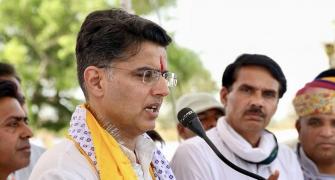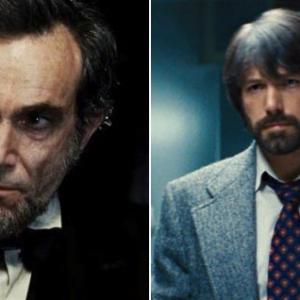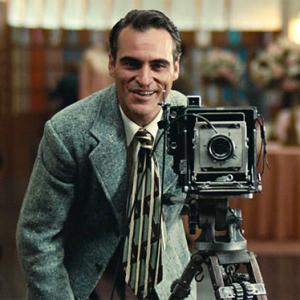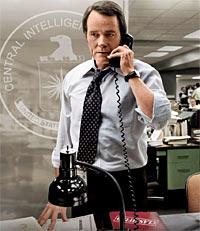 Argo seems all set to win the Best Picture Oscar award, but that will still not make Aseem Chhabra like the film. Here's why.
Argo seems all set to win the Best Picture Oscar award, but that will still not make Aseem Chhabra like the film. Here's why.
Ben Affleck’s Argo begins on the right political note -- a brief impartial history of Iran, told through animation in the calming voice of a woman.
It is an important reminder of the messy history of an otherwise rich country (in tradition, culture, food, etc.) and especially the role the US played in curtailing the proud nation’s democratic tradition and replacing it with a rule of terror and abuse, but friendly to American business interests.
Good thing that Affleck -- a liberal by all means (as is his thoughtful and politically correct producer George Clooney) -- covers Iran’s past, albeit briefly. Because much of Argo is anything but reflective and impartial.
As a fast pace thriller, with terrific editing and high-octane entertainment values, Argo is a crowd pleaser that is leading the pool of films in the race for the top Oscar to be awarded on February 25.
It is a well-crafted film and the last half hour -- as the film’s set of six 'innocent' American hostages attempt to escape from Tehran -- is pure edge-of-the-seat tension filed, gripping stuff that Hollywood does so very well.
That to me is the biggest issue with Affleck’s film -- it is too entertaining, too focused on pleasing the audience, and so far removed from how the real events would have shaped out, especially if the entire film has to believed as a true story.
In the process of appealing to the audience -- first and foremost American movie goers -- Argo loses its sense of balance.
It is understandable that the Iran hostage crisis was a tense situation in the US, especially for families. But the anti-Iran hysteria was also at its peak among red-neck Americans, the sort of madness we see each time America goes to war against a foreign country (read Asian or Middle Eastern country) or when this country is attacked -- Pearl Harbor and the terrorist strikes of September 11, 2001.
In all such times, a lot of America becomes unreasonable. And it is that kind of hysteria, which lives in many Americans that Argo taps into.
Every American character in Affleck’s film, even the cut-throat, jaded bureaucrats in Washington, DC, are portrayed as likeable human beings, who seem to be working for the forces of light. And in contrast every Iranian, baring one single character, is harsh, rough, and most of all scary. There is no doubt a film like that would appeal to Americans in large numbers, already brainwashed about the pariah state that Iran has become.
The film gives a human face to its American characters, to Affleck’s CIA agent Tony Mendez, who leaves a child behind with his mother as he takes the risky flight to Tehran (and in one of the most clichéd moments in the end of the film, Mendez reunites with his son and estranged wife), and to the six American hostages.
We slowly get to see who they are and understand their fears, their frustrations. They have warm, yet sad faces of scared individuals, locked up in the Canadian Ambassador’s home, with little hope of escaping from what seems like the most hellish place on earth -- a city called Tehran.
On the other hand, Affleck and his scriptwriter Chris Terrio do not give the Iranians in the film that option. The film affords no sympathy, no humanity to the Iranians. They are all presented as bearded, or veiled, angry anti-Americans, irrational, hostile foreigners screaming in a terrifying sounding, alien language.
We do not learn anything about their lives, their children, their fears and concerns. We learn nothing even about Sahar, the maid and the only sympathetic Iranian in all of Tehran. 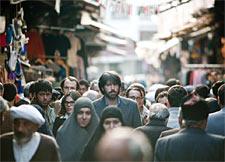 Each time we see the American characters -- especially the six hostages, the background music is lyrical and sad. Each time we see the Iranians, the volume is amped up, there are loud voices and dangerous noises. Even the day-break, morning call to Muslim prayer, normally a calming, peaceful sound, is used to represent hostile and tense moments, building up the suspense, all done to keep the American audiences on the edge.
Each time we see the American characters -- especially the six hostages, the background music is lyrical and sad. Each time we see the Iranians, the volume is amped up, there are loud voices and dangerous noises. Even the day-break, morning call to Muslim prayer, normally a calming, peaceful sound, is used to represent hostile and tense moments, building up the suspense, all done to keep the American audiences on the edge.
The escape scenes at the airport are so unreal, but they are necessary to appeal to Americans who are mostly responsible for making the $45 million film, with a rather foreign subject matter, a box office hit.
It is rather unfortunate that Argo shaped up into a film that transforms an important historical event, and a crisis situation from which America should have learned about the way it treats the rest of the world, into just another populist entertaining thriller.
Despite the good intentions that the opening sequence of the film seems to suggest, Argo is fairly racist in its tone, mood and representation of foreigners. And that makes it a highly problematic film.
Towards the end of Argo, as the Swissair plane takes off, with a convey of Iranian Revolutionary Guards chasing it on the runway, the flight attendant announces that alcoholic beverages will now be served and the background music soars. There is hugging and cheering on the plane. The good people of America are safe. Even Sahar, the maid crosses over to Iraq!
All is fine. And America -- the cowboy nation, can move onto its next adventure, meddling in the affairs of another far-flung country.
The thing is that I like Ben Affleck. He is smart, handsome, talented. He wrote a terrific script with his buddy Matt Damon (Good Will Hunting) and he comes from Boston, one of my favorite American cities. I only wish Argo was not so offensive.




